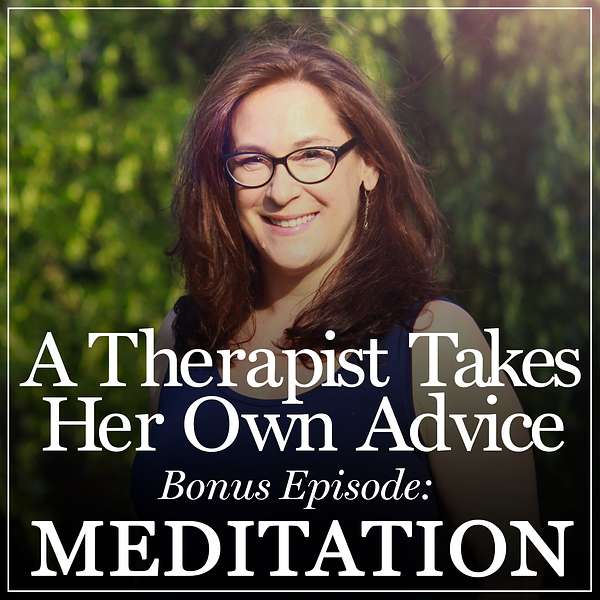
A Therapist Takes Her Own Advice
A Therapist Takes Her Own Advice is a podcast about healing from the inside out. When traditional treatments for depression stopped working, psychotherapist Rebekah Shackney turned to alternative medicine, breathwork, and spiritual practices to find her way forward.
Each episode offers honest conversations about emotional healing, trauma recovery, and the often nonlinear path to feeling whole. Whether you’re a fellow therapist, a seeker, or someone navigating your own transformation, this show offers insight, tools, and community for the journey.
https://rebekahshackney.com
Produced by David DibS Shackney.
Photo by David DibS Shackney
A Therapist Takes Her Own Advice
GUIDED MEDITATION - Observe Emotions
Do you feel like your emotions control you? Like they come on quickly and intensely taking you by surprise? Or Have you ever felt stuck in an uncomfortable emotion? When our lizard brain senses pain or discomfort our natural instinct is to try and suppress it or avoid it. That impulse to suppress painful feelings is understandable but avoiding emotions is not effective. It’s like trying to sink a ping pong ball in water...no matter how hard you try to push it down it keeps popping up. Similarly, when you push away painful emotions they keep floating back to the surface.
This mindfulness exercise is a guided meditation that allows you to build awareness of your emotions. By observing emotions you separate yourself from your emotions, you notice how the intensity ebbs and flows and most importantly you notice that even the most painful emotions eventually dissipate. The truth is nothing that enters your consciousness, no thought no feeling no sensation stays forever. With practice you will see that you are separate from your emotions and you can tolerate your emotions without acting on them.
Thanks so much for your support of A Therapist Takes Her Own Advice. If you connected with what you heard here, and you want to work with me, go to my website, rebekahshackney.com and send a message through my contact page. And if you have enjoyed what you’ve heard here, please subscribe, rate and review on Apple Podcasts or wherever you listen to podcasts.
Welcome to A Therapist Takes Her Own Advice! Don't forget to like and subscribe!
Instagram: ATherapistTakesHerOwnAdvice
www.RebekahShackney.com
Hi, I’m Rebekah Shackney, as a psychotherapist I spend my days helping people understand and accept their uncomfortable emotions, I tell my clients to notice their emotions without acting on their urges. But sometimes my emotions get the best of me. It’s hard not react when my child is screaming. But Like everyone else, I’m trying to better. This is A Therapist Takes Her Own Advice.
Do you feel like your emotions control you? Like they come on quickly and intensely taking you by surprise? Or Have you ever felt stuck in an uncomfortable emotion? When our lizard brain senses pain or discomfort our natural instinct is to try and suppress it or avoid it. That impulse to suppress painful feelings is understandable but avoiding emotions is not effective. It’s like trying to sink a ping pong ball in water...no matter how hard you try to push it down it keeps popping up. Similarly, when you push away painful emotions they keep floating back to the surface.
This mindfulness exercise is a guided meditation that allows you to build awareness of your emotions. By observing emotions you separate yourself from your emotions, you notice how the intensity ebbs and flows and most importantly you notice that even the most painful emotions eventually dissipate. The truth is nothing that enters your consciousness, no thought no feeling no sensation stays forever. With practice you will see that you are separate from your emotions and you can tolerate your emotions without acting on them.
To begin find a place where you won’t be disturbed. Sit or lie in a comfortable position. Close your eyes and take a few long, slow, deep breaths. With each exhalation allow your body to become more and more relaxed.
Start to become aware of your current emotion. Maybe it’s clear, sadness, fear, joy, or maybe it’s more muddled, anxiety, ambivalence, boredom, some mixture. Don’t worry if it’s difficult to identify, and that’s okay. Just allow yourself to observe whatever arises. Just observe.
Notice how your emotion manifests in your body. Where do you feel sensations? In your chest, in your stomach, in an overall sensation. What is the quality of the sensations? Breath and open yourself completely to your emotion and notice how the sensations shifts.
Hold your emotion at arm’s length and watch how it ebbs and flows rather than remaining stagnant.
Watch without suppressing or grasping for the emotion. Just allow it.
Meet your emotions with curiosity and acceptance. Notice without judgement.
Bring your awareness to any urges to act on your emotion. Relax around the urge without judging it or giving in to it and see that eventually it changes.
Your emotions are an aspect of your experience, they do not define you. They will not destroy you, and you will not feel this way forever.
Continue to breath as you observe your emotion without judgement.
Take a few more long slow deep breaths and when you’re ready open your eyes and return your focus to the room.
This meditation encourages you to lean into your emotional experience. Regular practice will allow you to become accustomed to how your emotions manifest in your mind and body and allow you to manage them more effectively.